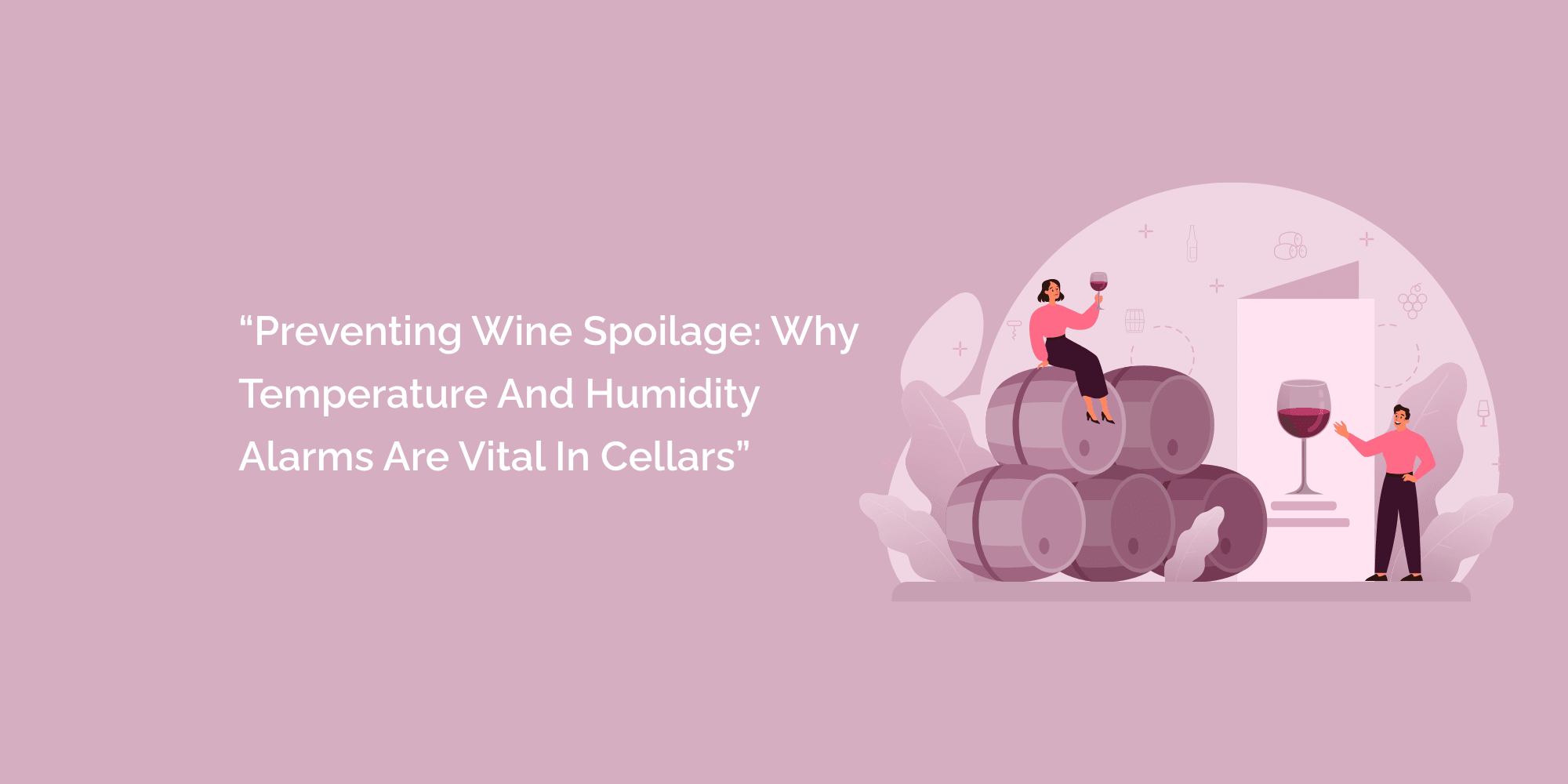For wine enthusiasts and collectors, ensuring the optimal storage conditions for their precious bottles is paramount. Temperature and humidity play a crucial role in the aging and preservation of wines, and any fluctuations in these factors can lead to irreversible damage, spoilage, or loss of flavor and aroma. This is where temperature and humidity alarms come into play. This blog will explore the importance of temperature and humidity alarms in wine cellars and discuss how they help prevent wine spoilage. By providing continuous monitoring, real-time alerts, and the ability to maintain precise storage conditions, these alarms play a vital role in preserving the quality and integrity of wines, allowing wine enthusiasts to enjoy their collections to the fullest.
The Impact of Temperature Fluctuations on Wine
Temperature fluctuations can have a significant impact on the chemical reactions that occur within a bottle of wine. We will discuss how high temperatures can accelerate aging, resulting in premature oxidation and loss of freshness. In contrast, low temperatures can hinder the aging process, leading to a lack of complexity and character in the wine. Temperature alarms help maintain a stable and consistent temperature range, protecting wines from these undesirable effects.
The Role of Humidity in Wine Preservation
Humidity is equally vital in wine cellars, as it affects the integrity of corks and the evaporation rate of wines. We will explain how low humidity levels can cause cork drying and allow excessive oxygen ingress, while high humidity can promote mold growth and label deterioration. Temperature and humidity alarms work in tandem to ensure the optimal humidity range, protecting corks and maintaining the wine's seal and overall quality.
The Risks of Inadequate Monitoring
Inadequate temperature and humidity monitoring in wine cellars poses various risks. We will discuss the potential consequences of uncontrolled conditions, including accelerated aging, off-flavors, compromised aromas, and even the complete spoilage of wines. Without proper monitoring and timely alerts, cellar owners may unknowingly expose their wines to dangerous conditions, resulting in irreversible damage.
Continuous Monitoring and Early Detection
Temperature and humidity alarms continuously monitor cellar conditions, allowing for early detection of deviations from the desired range. We will highlight how real-time alerts enable cellar owners to act immediately when temperatures or humidity levels fluctuate, such as adjusting cooling systems, addressing humidity imbalances, or inspecting potential equipment failures.
Preserving the Aging Potential of Wines
Proper temperature and humidity control are crucial for preserving the aging potential of wines. We will discuss how consistent storage conditions help wines develop complexity, elegance, and desirable flavors over time. Temperature and humidity alarms ensure that wines are stored within the optimal range, allowing them to age gracefully and reach their full potential.
Protecting Investments and Valuable Collections
Wine collections often represent significant investments and hold sentimental value. We will explore how temperature and humidity alarms protect these valuable assets by safeguarding them against spoilage and ensuring the long-term preservation of the wines. By maintaining ideal storage conditions, cellar owners can protect their investments and enjoy their collections for years.
Compliance with Wine Storage Standards
Temperature and humidity alarms are crucial in meeting industry standards and regulations for wine storage. We will discuss various guidelines provided by organizations such as the International Organization of Vine and Wine (OIV) and regional wine associations. Compliance with these standards ensures wine quality and supports cellar owners' reputations as responsible and knowledgeable wine enthusiasts.
Integration and Monitoring Capabilities
Temperature and humidity alarms often have advanced features, including integration with other cellar management systems and remote monitoring capabilities. We will explain how these features allow cellar owners to access real-time data, receive alerts on their mobile devices, and remotely monitor their cellar conditions, providing convenience and peace of mind, even when they are away.
Choosing the Right Temperature and Humidity Alarm
The right temperature and humidity alarm system is crucial for wine cellar owners. We will discuss critical factors, such as accuracy, reliability, customization options, user-friendly interface, remote monitoring capabilities, integration possibilities, ease of installation and maintenance, customer support, and value for money. Understanding these factors will empower cellar owners to decide when to choose an alarm system that aligns with their specific needs and budget.
Certainly! Here are some frequently asked questions (FAQs) about the importance of temperature and humidity alarms in wine cellars:
Why are temperature and humidity alarms important in wine cellars?
Temperature and humidity alarms are crucial in wine cellars because they help maintain optimal wine storage conditions. Fluctuations in temperature and humidity can lead to wine spoilage, loss of flavor, and diminished aging potential. Alarms provide continuous monitoring and timely alerts to prevent such issues.
What are the risks of inadequate temperature and humidity control in wine cellars?
Inadequate temperature and humidity control can result in accelerated aging, oxidation, off-flavors, and spoilage of wines. High temperatures can cause premature aging, while low temperatures can slow aging. Inconsistent humidity levels can lead to cork drying or mold growth, impacting wine quality.
How do temperature and humidity alarms work in wine cellars?
Temperature and humidity alarms consist of sensors placed in wine cellars to monitor the environmental conditions. These sensors transmit data to a central monitoring unit or software that analyzes the readings. If the temperature or humidity deviates from the desired range, the alarm system triggers alerts to notify cellar owners.
Conclusion
Temperature and humidity alarms are essential for wine cellar owners, ensuring optimal storage conditions for preserving wine quality and preventing spoilage. By maintaining stable and consistent temperatures, controlling humidity levels, and providing timely alerts, these alarms protect valuable wine collections and allow wine enthusiasts to enjoy the complexity and beauty of each bottle fully. Investing in a reliable temperature and humidity alarm system is a wise decision that offers peace of mind and safeguards against wine spoilage. It supports the long-term preservation of cherished wines.








